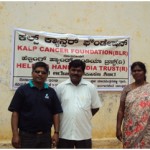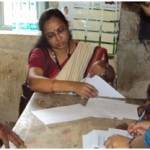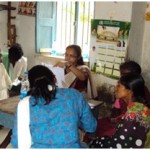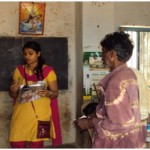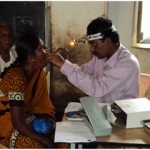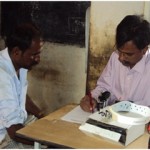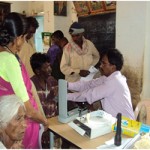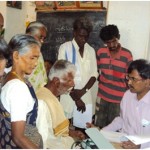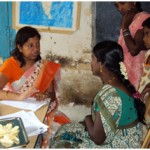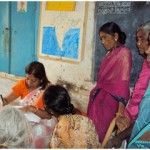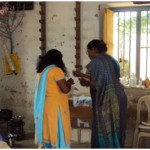Cancer Screening Camps in Bangarpet on 25th May, 2013
- 25
- May
The main objectives of Kalp Cancer Foundation are prevention and early detection of cancers and creating awareness.
Prevention – Tobacco usage and HPV infection prevention remain two main aspects of this approach. Screening camps are conducted for the detection of HPV infection. If treated appropriately this helps in prevention of cervical cancers. The Awareness programs for tobacco usage for young citizens are done through education in rural and urban schools. The focus is to target them in early ages so as to keep them away from tobacco and mould them in right way. Effort is made to involve local teachers and other support service providers. Genetic counseling is offered to familial cancers.
Early Detection – Early detection of common cancers is done by free screening camps conducted in designated areas which are identified by the group. Emphasis is laid on reaching out to those areas which are amenable for successful conduct of these activities. Short term and long term assessments will be made on the compliance and results of the screening camps. The three common cancers which we aim to target are oral, cervical and breast cancers. Also we will create awareness about symptoms and signs of these cancers.
Education – By creating booklets in local languages and with the use of audiovisual aids, our team will educate general public about risk factors of cancers and how they can be avoided. Also self examination for breast and oral cancer will be taught.
How do we conduct screening camps?
To conduct cancer detection camps effectively, Kalp has decided to start work in one geographical area in rural Karnataka. We have identified Bangarpet Taluk in Kolar district as our target area. There are 400 villages under this taluk. A cancer screening camp will be conducted every month covering 3 to 4 villages depending upon the population.
Since there is lot of misconceptions and taboos about cancer in general, people need lots of motivation to attend cancer screening camps. We have tied up with local NGOs, whose volunteers help in this purpose. Prior to the camp, they do door to door visit, distribute pamphlets and encourage people to participate in camps. On the day of camp, before conducting screening, both men and women are divided in small groups and the purpose of camp is explained. Audio-Visual displays are run in local languages to educate them about common cancers. We also conduct other tests related to lifestyle diseases like blood pressure and blood sugar check up in order to encourage people to participate in the camps.
We have adopted following guidelines for screening of cancers.
Cervical Cancer
- Target population: Females between 20 to 59 yrs of age
- Screening method: Visual inspection with acetic acid (VIA)
If any abnormality is found, standard guidelines will be followed to treat that condition. If the test is normal, then re-screening will be done after 5 yrs.
Breast Cancer
- Target population: Females starting at the age of 20 yrs
- Screening method:
- Breast self examination starting at the age of 20 yrs
- Clinical Breast Examination – every three years for age group 20 to 39 yrs and yearly for 40 to 49 yrs
- Mammogram – every year for women more than 50 yrs but will be optional
Oral Cancer
- Target population: All tobacco users
- Screening method:
- Clinical examination by doctor every year
- Oral self examination every month by a tobacco user.
The first camp in Bangarpet was conducted at Madhumuthenahalli Village on 25th of May in association with Helping Hands India Trust covering four surrounding villages. The camp was conducted in a local school. Dr.Arunaprasad, Dr.Sangi Reddy, Dr.Geeta Narayanan and Dr.Rajashree participated in the camp. The majority of the men and women who were screened were pan chewers with tobacco. Also we found that many were addicted to alcohol. Most of them had a very unhealthy mucosa and some of them already had premalignant changes. One case of suspicious oral cancer was detected and was referred for further evaluation. Two females had thyroid swellings and were advised to undergo needle test. PAP smears were taken in ten suspicious cases for cervical abnormality and were sent for further cytological evaluation.
We felt that lot of efforts are needed to motivate these people to quit tobacco and alcohol.

